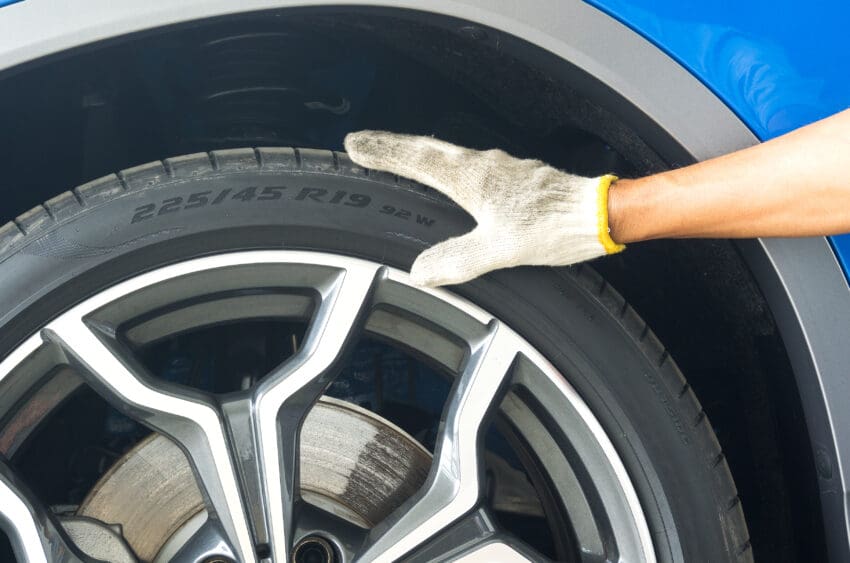What Difference Does the Wheel Size Make?
Upgrading or changing your wheel size can significantly impact how your car performs and looks.
Whether you’re wondering, “are bigger wheels better?” or “does tire size matter?”, understanding how wheel size affects your car’s handling, fuel efficiency, and overall performance is essential before making any changes.
This guide explains how wheel size affects car performance, the benefits and drawbacks of bigger wheels, and when tire size really makes a difference.
How Does Wheel Size Affect Car Performance?
The size of your wheels—both the diameter and width—directly affects multiple aspects of your vehicle’s performance. Here’s a breakdown of key factors to consider:
1. Handling and Grip
Larger wheels often improve handling because they increase the tire’s contact with the road, offering more grip during cornering and high-speed driving. A wider wheel can hold a wider tire, providing better traction and stability. However, it’s important to match tire size to the wheel size for proper handling.
- Wider Wheels: Wider wheels provide a larger surface area for the tire, improving grip on dry roads. However, they can reduce handling in wet or snowy conditions due to the increased likelihood of hydroplaning.
- Narrower Wheels: Narrow wheels, typically found on smaller cars, offer less rolling resistance, which can enhance fuel efficiency but may not provide as much cornering stability as wider wheels.
Conclusion: Wheel width does matter, especially in performance vehicles where wider wheels provide better grip and stability. However, for everyday driving, a balance between width and tire size is key for all-weather traction.
2. Ride Comfort
Larger wheels generally result in a lower profile tire (thinner sidewalls), which means less cushioning between the wheel and the road. This can lead to a firmer, more uncomfortable ride, especially on rough roads or potholes.
- Smaller Wheels: With more tire sidewall, smaller wheels absorb road imperfections better, providing a smoother, more comfortable ride.
- Bigger Wheels: Larger wheels, while providing a sportier look and improved cornering stability, often reduce ride comfort due to thinner tire sidewalls.
Conclusion: Bigger wheels may not be better for ride comfort, as they can lead to a harsher experience on rough or uneven roads.
3. Acceleration and Braking
Larger wheels are generally heavier than smaller wheels, which can negatively affect acceleration and braking performance. The added weight (especially at the outer edges of the wheel) requires more power from the engine to accelerate and can increase braking distances.
- Bigger Wheels: Heavier and can slow down acceleration due to the increased rotational mass. This is especially noticeable in smaller cars with lower power.
- Smaller Wheels: Lighter, offering quicker acceleration and shorter braking distances due to less rotational inertia.
Conclusion: Does wheel size matter for acceleration? Yes. Bigger wheels can reduce acceleration, especially in less powerful cars. For better performance, lighter wheels or those closer to stock size are often ideal.
4. Fuel Efficiency
Larger wheels and tires often result in decreased fuel efficiency. The extra weight and greater rolling resistance require more energy from the engine, leading to higher fuel consumption.
- Smaller Wheels: Typically offer better fuel efficiency due to lower weight and less rolling resistance.
- Bigger Wheels: Heavier and increase rolling resistance, leading to reduced fuel economy.
Conclusion: If fuel efficiency is a priority, sticking to stock or smaller wheel sizes can be more beneficial.
Are Bigger Wheels Better?
The answer depends on what you value most in terms of performance, comfort, and style. Here’s a look at the pros and cons of bigger wheels.
Pros of Bigger Wheels
- Improved Handling: Wider tires with bigger wheels offer better cornering and traction, especially in dry conditions.
- Sporty Aesthetics: Larger wheels give cars a more aggressive, performance-oriented look. For instance, American Racing Wheels offer a bold and classic style perfect for enhancing vehicle appearance.
- Brake Clearance: Bigger wheels provide more room for larger brake calipers, which can enhance braking performance in performance vehicles.
Cons of Bigger Wheels
- Decreased Ride Comfort: The thinner tires on larger wheels can lead to a harsher ride, especially on rough roads.
- Reduced Fuel Efficiency: Bigger wheels and tires can increase fuel consumption due to added weight and rolling resistance.
- Slower Acceleration: The additional rotational mass can negatively impact acceleration.
- Higher Cost: Larger wheels and tires are typically more expensive, both in terms of initial purchase and potential replacement costs.
Are Bigger Tires Better?
In addition to wheel size, tire size plays a significant role in vehicle performance. Here’s how bigger tires can affect your car:
- Improved Off-Roading: Larger tires, particularly those with more tread, offer better traction and durability for off-road driving. For off-road enthusiasts, Black Rhino Wheels are an excellent option.
- Increased Ground Clearance: Bigger tires raise the vehicle’s ground clearance, which can be helpful for off-road or rugged terrain.
- Worse Fuel Efficiency: Like larger wheels, bigger tires have more rolling resistance, which decreases fuel efficiency.
- Potential Speedometer Errors: Larger tires can alter your speedometer readings, causing them to be inaccurate.
Conclusion: Bigger tires are better if you need increased ground clearance or off-road capability, but they can negatively affect fuel efficiency and handling on paved roads.
Does Tire Size Matter?
Yes, tire size does matter. When upgrading or replacing wheels, it’s essential to consider the corresponding tire size. A tire that’s too wide or too large for your wheel can negatively impact your car’s handling, safety, and fuel efficiency. Always ensure that the new tires you choose are compatible with your car’s wheels and specifications.
Key Tire Size Factors:
- Aspect Ratio: The height of the tire sidewall relative to its width. Lower aspect ratios (common with larger wheels) provide better cornering performance but can reduce ride comfort.
- Width: Wider tires offer more grip but can lead to worse fuel efficiency and increased wear on suspension components.
- Diameter: Changing your tire’s overall diameter can affect your speedometer and odometer readings.
Final Thoughts
Does wheel size matter? Absolutely. The right wheel size depends on your driving habits, preferences, and vehicle requirements. While bigger wheels can offer improved handling and a sportier look, they may reduce ride comfort, fuel efficiency, and acceleration. Smaller wheels, on the other hand, provide a smoother ride and better fuel economy but may have different aesthetic appeal and performance benefits.
When choosing your next set of wheels, balance the benefits of increased performance or style with potential drawbacks like reduced comfort or efficiency. For a wide range of wheel options, Ferrada Wheels offers stylish and high-performance wheels that cater to various needs. Always consult your vehicle’s specifications to ensure you choose the right size for optimal performance and safety.






